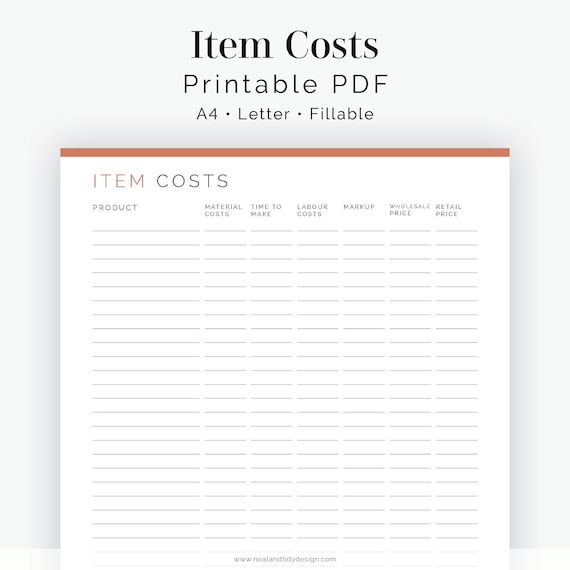5 days agoIf your production costs are $50 and you want to achieve a 40% profit margin, your selling price would be $70. $50 x (1 + 0.40) = $70. Cost plus pricing is one way to price your products and create profit for your business. But don’t make up your mind just yet.
Product Pricing Calculator Excel Template | Price Calculator
The cost-plus method, sometimes called gross margin pricing, is perhaps most widely used by marketers to set price. The manager selects as a goal a particular gross margin that will produce a desirable profit level. Gross margin is the difference between how much the goods cost and the actual price for which it sells.

Source Image: etsy.com
Download Image
The cost plus pricing formula is simply to calculate the cost of a product, plus a profit margin percentage. It is done by multiplying the total costs, such as material costs, direct labor costs, and overhead costs, by 1. The next step is to add profit. For a 25% profit margin, you would multiply your costs by 1.25 to get the sale price.

Source Image: brainly.com
Download Image
Unlock the Secrets of Typical General Contractor Markup! For remodeling, you will often hear the phrase “10 and 10” — meaning 10% overhead and 10% profit for a total markup of 20%. You could consider this a benchmark. I’ve seen numbers as low as 10% and as high as 40% in high-end markets. Cost-plus is used less frequently in new custom construction. I would expect to see lower numbers in the

Source Image: hislide.io
Download Image
In Cost-Plus Pricing The Markup Consists Of
For remodeling, you will often hear the phrase “10 and 10” — meaning 10% overhead and 10% profit for a total markup of 20%. You could consider this a benchmark. I’ve seen numbers as low as 10% and as high as 40% in high-end markets. Cost-plus is used less frequently in new custom construction. I would expect to see lower numbers in the For example, a man’s tie costs $4.60 and is sold for $8. The dollar mark-up is $3.40. The mark-up may be designated as a percent of selling price 0; as a percent of cost of the merchandise. There are several reasons why expressing mark-up as a percentage of selling price is preferred to expressing it as a percentage of cost.
Types of Pricing Strategies Scheme
Sep 20, 2023Cost-plus pricing is where a markup percentage is added to a product’s unit cost to make the final selling price. At first glance, it might seem like a straightforward strategy for retail companies, but in the SaaS, specific nuances exist. Selling Price = CAC (Customer Acquisition Cost) + COGS (Cost of Goods Sold) + Desired Margin. Pricing Calculator Worksheet to Price Handmade Products Auto Calculating Cost of Goods Spreadsheet Template for Numbers on Mac – Etsy

Source Image: etsy.com
Download Image
Cost plus pricing: Maximizing Profit with Cost Plus Pricing Strategies – FasterCapital Sep 20, 2023Cost-plus pricing is where a markup percentage is added to a product’s unit cost to make the final selling price. At first glance, it might seem like a straightforward strategy for retail companies, but in the SaaS, specific nuances exist. Selling Price = CAC (Customer Acquisition Cost) + COGS (Cost of Goods Sold) + Desired Margin.

Source Image: fastercapital.com
Download Image
Product Pricing Calculator Excel Template | Price Calculator 5 days agoIf your production costs are $50 and you want to achieve a 40% profit margin, your selling price would be $70. $50 x (1 + 0.40) = $70. Cost plus pricing is one way to price your products and create profit for your business. But don’t make up your mind just yet.

Source Image: someka.net
Download Image
Unlock the Secrets of Typical General Contractor Markup! The cost plus pricing formula is simply to calculate the cost of a product, plus a profit margin percentage. It is done by multiplying the total costs, such as material costs, direct labor costs, and overhead costs, by 1. The next step is to add profit. For a 25% profit margin, you would multiply your costs by 1.25 to get the sale price.

Source Image: invoiceowl.com
Download Image
Margin vs. Markup: Calculating Both for Your Alcohol Brand – Overproof Example A shop selling a vacuum cleaner will be examined since retail stores generally adopt this strategy. Total cost = $450 Markup percentage = 12% Markup price = (unit cost * markup percentage) Markup price = $450 * 0.12 Markup price = $54 Sales Price = unit cost + markup price Sales Price= $450 + $54 Sales Price = $504

Source Image: overproof.com
Download Image
In cost plus pricing the markup consists of a manufacturing costs b desired ROI | Course Hero For remodeling, you will often hear the phrase “10 and 10” — meaning 10% overhead and 10% profit for a total markup of 20%. You could consider this a benchmark. I’ve seen numbers as low as 10% and as high as 40% in high-end markets. Cost-plus is used less frequently in new custom construction. I would expect to see lower numbers in the

Source Image: coursehero.com
Download Image
Solved Question 18 In cost-plus pricing, the markup consists | Chegg.com For example, a man’s tie costs $4.60 and is sold for $8. The dollar mark-up is $3.40. The mark-up may be designated as a percent of selling price 0; as a percent of cost of the merchandise. There are several reasons why expressing mark-up as a percentage of selling price is preferred to expressing it as a percentage of cost.

Source Image: chegg.com
Download Image
Cost plus pricing: Maximizing Profit with Cost Plus Pricing Strategies – FasterCapital
Solved Question 18 In cost-plus pricing, the markup consists | Chegg.com The cost-plus method, sometimes called gross margin pricing, is perhaps most widely used by marketers to set price. The manager selects as a goal a particular gross margin that will produce a desirable profit level. Gross margin is the difference between how much the goods cost and the actual price for which it sells.
Unlock the Secrets of Typical General Contractor Markup! In cost plus pricing the markup consists of a manufacturing costs b desired ROI | Course Hero Example A shop selling a vacuum cleaner will be examined since retail stores generally adopt this strategy. Total cost = $450 Markup percentage = 12% Markup price = (unit cost * markup percentage) Markup price = $450 * 0.12 Markup price = $54 Sales Price = unit cost + markup price Sales Price= $450 + $54 Sales Price = $504